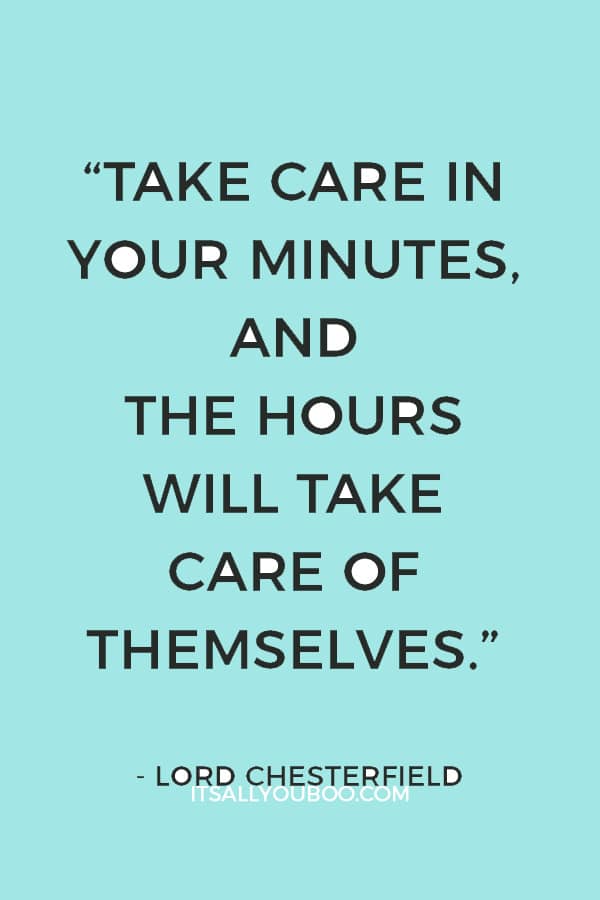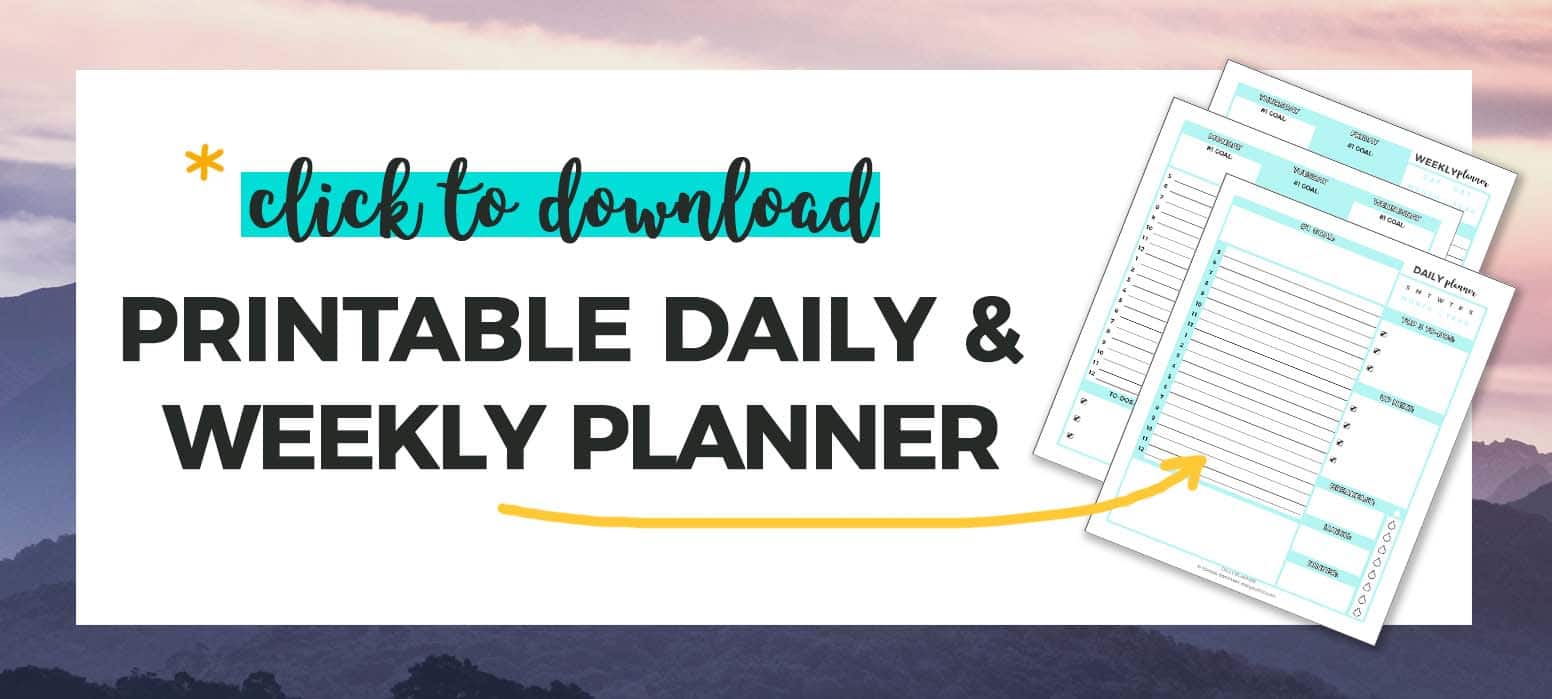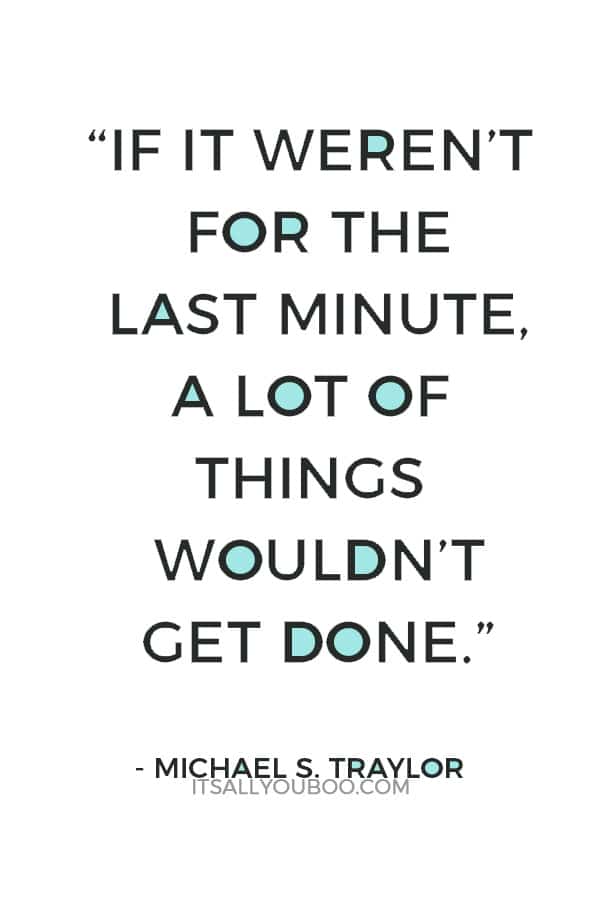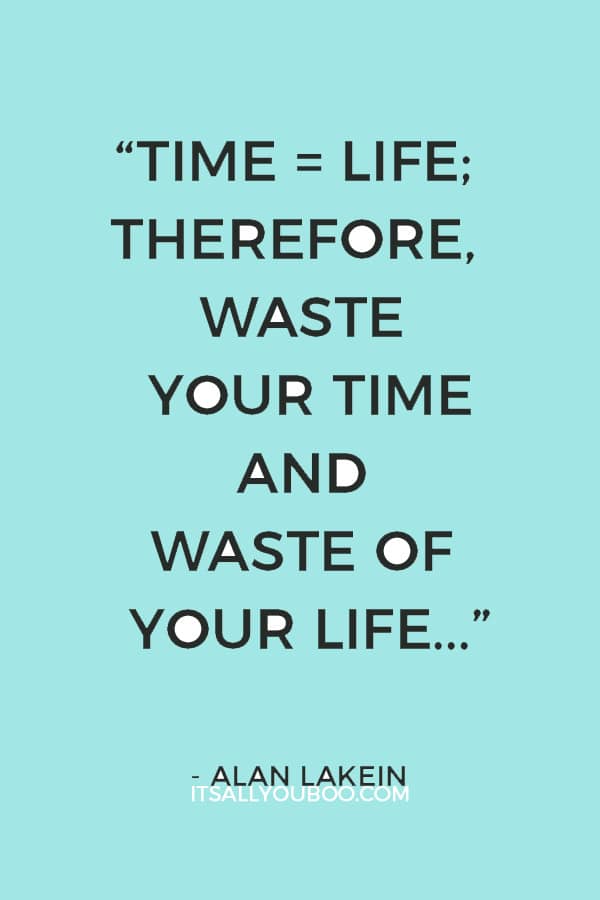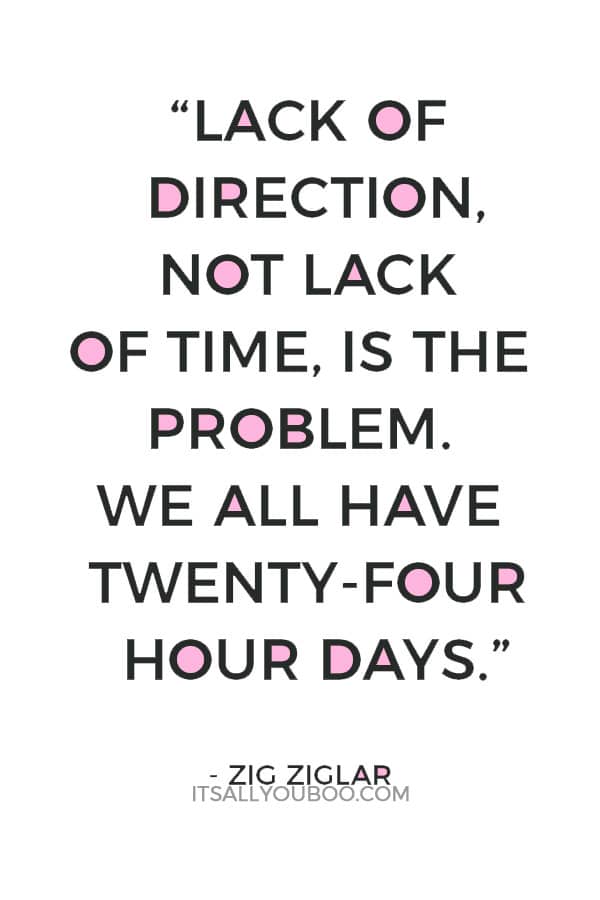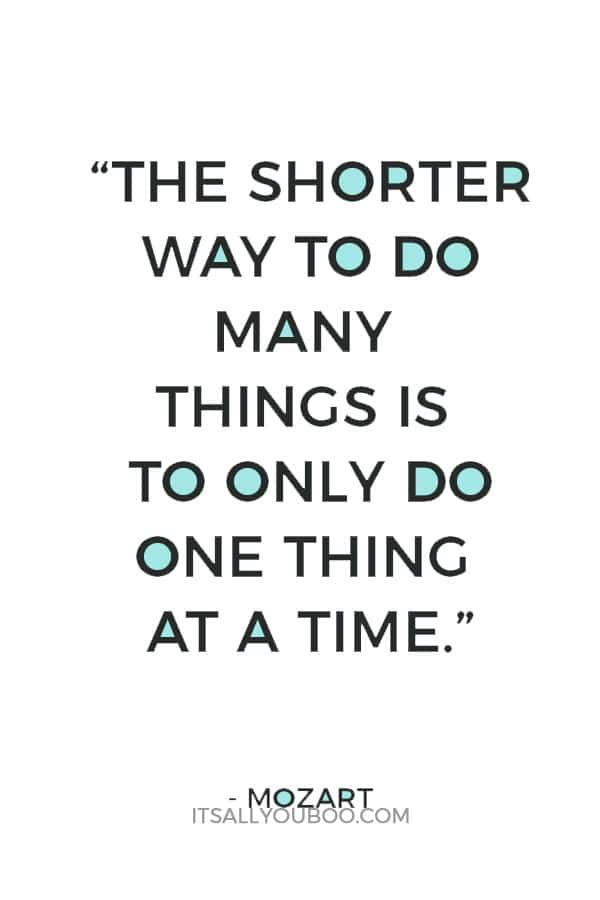Want to schedule your day effectively and block time?
Do you want to increase your productivity? Ready to get more done each and every day?
The first step is to plan your day right. It sounds easy, but it can be a real challenge. Especially if you’re a busy working mom, a stressed-out college student or entrepreneur.
With so much to do, it’s no wonder we get overwhelmed with life and work, stressed out and anxious, and in some cases desperate for work-life balance.
Table of Contents:
So, how do you stay organized, manage your responsibilities and actually stay focused and productive with “all the things” to do?
If you’re like most people, you probably use just a to-do list for that. You write down a massive list of everything you need to accomplish in a day or a week.
But you can be more efficient if you also use time blocking. Where to-do lists can lead to overwhelm and fatigue, time blocking leads to getting more done in a short amount of time.
In this article, I’ll tell you exactly what time blocking in and how you can use it to plan your day effectively.
THIS POST MAY CONTAIN AFFILIATE LINKS.
IF YOU MAKE A PURCHASE FROM THESE LINKS, I MAY EARN A SMALL COMMISSION.
CLICK HERE FOR MY FULL DISCLAIMER STATEMENT.
What is Time Blocking?
Time blocking is a process where you simply assigning your tasks to specific blocks of time during the day.
So rather than having a random to-do list that you have to finish before 5 PM, you’ll have several blocks of time dedicated to completing individual tasks one at a time.
During that time you are solely focused on completing that task, not trying to multi-task at all.
Here’s an example:
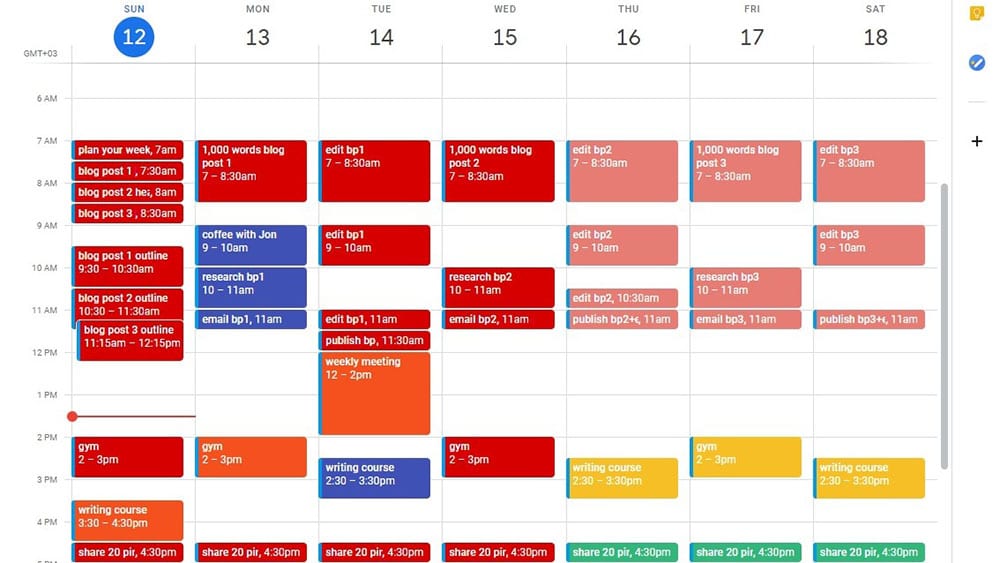
If you have trouble finding time to focus on your priorities because you have so many other things going on, this technique is the perfect solution for you.
The idea is you’ll dedicate your time on your task and ignore anything else, no matter what.
Sure, you won’t be able to always do that. But with a little practice, you can do it consistently.
The Benefits of Time Blocking
I’ve used time blocking for many years, in both working and my personal life.
And believe me: It seems difficult when you’re a beginner. But I promise it’s worth your time. Literally!
Even top performers and successful entrepreneurs – like Bill Gates or Elon Musk – use this method to get work done.
👉🏽 RELATED POST: 10 Things You Need to Stop Doing to Be Productive
Time blocking:
- Adds structure and organization to your day: Because you know exactly what to do and when. You don’t wake up feeling confused and wondering what task to finish from your to-do list. You already planned each part of your day one night before.
- It builds a habit of discipline. Yes, working in time blocks requires discipline. And that’s a good thing. Discipline is one of the qualities of successful people.
- It helps you ignore multitasking: Once you dedicate to work on something specific, you have to ignore any other task. And when you focus on one thing at a time, you’ll get more accomplished faster.
- Allows you to focus on your priorities: No one has enough time to do everything. But you have time to do something that’s important each day. Time blocking allows you to do this better. You’ll be more aware of the importance of prioritization. And this will reflect in your results.
- Provides accountability: You can use this method to measure your productivity and improve it. I’ll talk more about that later.
…and so on.
I could make my list longer but you get the idea.
Probably the best benefit of time blocking is that you’ll be tempted to make the most of every hour.
More Time Doesn’t Mean More Productivity
The effect of Parkinson’s Law is a real problem:
‘’Work expands so as to fill the time available for its completion.’’
Even if you haven’t heard of it, I bet you’ve noticed it before.
When you have a week to do something, it usually takes a week. You take extra time doing each part, not hurrying to finish early.
When you need to finish something tomorrow, you get right on it in the morning and focus only on that. You have a deadline and no choice but to work as hard as you can.
Most people like to give plenty of extra time in case they don’t finish something. That’s not very productive.
It’s better to limit your time to the lowest amount you think is realistic (without rushing anything, of course).
For example, if I think I can do a task in a day, that’s how long I allow for it. The less time you have to finish your work, the more productive you will be.
How do You Effectively Block Time?
Ok, maybe I convinced you to try this technique.
But you might still wonder… How to schedule your day effectively?
As I said, time-blocking requires you to set a certain amount of time for each one of your tasks.
The problem is that you will estimate this time wrong. When I first started to use time-blocking, it turned out I had no idea what I was doing. Most of my work took me longer or shorter than I expected.
How can you avoid this?
Make a time audit. Track your regular tasks for a week or two and see how long it really takes to finish them.
Then, when you’re ready to apply this technique, set your working time based on your energy.
If you’re a morning person, I suggest doing the hard work after you wake up. If you’re a night owl, work hard after midnight.
Why is this so important? Because there are certain times in the day when you’re super productive.
And you don’t want to time block 2 hours on a task in the afternoon if you can finish it in 30 minutes during the morning.
Plan your hours right and you’ll save a ton of time.
👉🏽 RELATED POST: How to Project Manage Your Goals
Transfer Your List to Your Calendar
You don’t necessarily need a spreadsheet for time-blocking.
A calendar app it’s better because you can set reminders and keep yourself accountable much easier.
I personally like Google Calendar but you’ll find many similar options, like Asana or even Trello.
Alternatively, you can also use a printable planner, like this daily and weekly printable.
When I plan my day, I use different colors for my tasks.
More exactly:
- pink (for what’s important)
- yellow (for what’s not so important)
- green (for what’s not important at all)
I also edit the schedule when the day ends with:
- red (finished)
- orange (half-finished)
- dark blue (not started)
Let’s use again the first example:
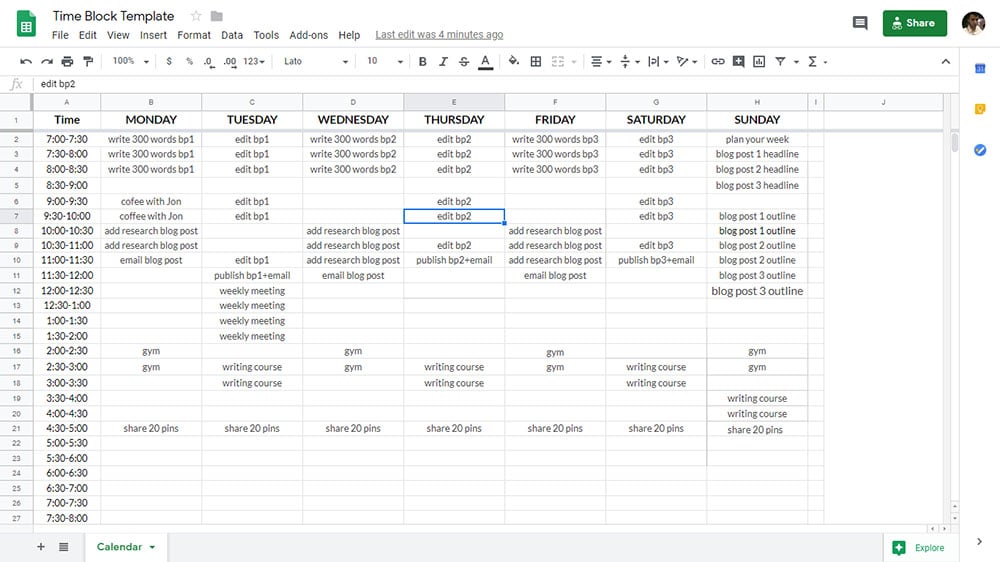
What do you think?
Please remember the next thing: Schedule the result, not the activity.
For example, if you want to write, you can schedule “write 1,000 words” from 12 pm to 1 pm on Sunday.
Don’t schedule this activity, like “writing”. There’s no way to measure what you actually produced during this time if you schedule the activity.
On the other hand, if you do what I say, you could always take a realistic look at yourself. Even if you write 500 words instead of 1,000, you can edit that.
I schedule the exact results I expect for the most part of my work. And I highly recommend the same.
Schedule More in Less Time with Time Blocking
Busy isn’t equal productive, right?
Right!
However, you can schedule more tasks in less time.
As long as they’re important and produce results, there’s no problem.
In fact, it’s counterintuitive.
When you do more tasks, you are happier, feel more energized, and get motivated. It’s a completely different energy when you have 1 hour for a task, instead of 10. You’re in a hurry. And you’re able to perform better.
I used to make the mistake of wasting my time blogging. I’d spend all day “blogging,” but the truth is that a lot of the time was spent on Instagram and Youtube. Why? Because I didn’t have too much to do.
When I changed my process to scheduling more ahead of time, I had to work differently.
I wasn’t on social media messing around anymore. I took everything seriously. I was focused on getting done what I needed to. I create a social media strategy, instead of just pretending to be busy.
If you think you’re overscheduling, you’re not. Schedule more in less time. If you’re the kind of person that works hard, you’ll be surprised how much you’re capable of.
Avoid Distractions with Time Blocking
Even if you apply my tips, time-blocking is going to be a challenge for you.
Why? Because there are many distractions that could come in your way. Fortunately, they’re easy to avoid.
Turn off your phone and keep it in another room.
If you also work in a quiet place, you already solved 90% of your problems.
What else could you do? Take breaks.
Yeah, seriously. Taking breaks usually makes us more productive.
In fact, studies have shown that taking 17 minutes break after 52 minutes of working straight, our productivity level is at its highest.
It makes sense when you think about it. After working for 1 hour or more, you lose focus, get bored, and can’t concentrate well.
Breaks don’t need to be exactly this length, but a few minutes every 30-50 minutes is a good idea. You should know how much time it takes before your concentration starts to lose.
👉🏽 RELATED POST: Top 10 Productivity Tips & Tricks
If you’re not sure where to start, I highly recommend the 30-30-60 solution.
It’s very simple:
- Set a timer for 50 minutes
- Work until the timer finishes
- Take a 5-minute break
- Repeat the process
- Take a 30-minute break
Here’s an online timer but feel free to use anything you want. The point is to stay focused and fresh while working.
Commit to Following Your Calendar
Your brain is wired to seek pleasure and avoid pain. This means when you go to do something that takes you off your comfort zone, you’re going to feel resistance.
Your brain would rather you do nothing. It’s easier and saves energy.
So, once you’ve done all your planning and the time comes for you to actually practice time-blocking, remember this: You’ll be tempted to ignore everything. Your brain is going to come up with a million reasons why you shouldn’t do anything at all.
Don’t listen to it.
Make a commitment to take action anyway.
This happens to me each day. I expect to not want to do the tasks on my calendar. And I’m always right. I’m never motivated. But I do them anyway. And once I start, my brain shut up and I get the energy to finish.
The feeling of laziness is normal. Nothing has gone wrong.
Do the thing on your calendar. No matter what.
👉🏽 RELATED POST: 8 Motivation Killers You Need to Know About
What if Time Blocking Doesn’t Work for You?
Time-blocking is not just a technique. It’s also a habit.
It could be difficult (or even impossible) to use it from the beginning. But you will learn how to do it over time.
If you struggle, you need to start smaller.
Schedule just one task in your calendar each day. Or give yourself a daily theme. It should make everything easier.
That’s how I started too. Give yourself a reward when you finish and try to do the same task at the same time every day. After a while, it’ll become something normal and you’ll be able to go further.
👉🏽 RELATED POST: How to Form a Habit Based on Science
Cross Off the Things that Eat up Your Time Each Day
When you think about it, there are only a handful of things that will really impact your life.
Those are things like:
- your job and side-hustle
- other tasks that bring you money
- emotional health and wellness
- healthy habits like going to the gym
- online courses that teach you something
Sounds pretty logical, right?
Just a couple of tasks really contribute to your life.
And they’re not the emails you ‘’have’’ to answer. It’s also not a pointless meeting you want to do.
When is the last time you did these things and positively made a change in your life?
Emails are not so important for most of us.
So if we’re being totally honest, you only need to check it 1x a day, and that’s just to satisfy your curiosity.
Which means you can block out time for email + administrative stuff when the day ends.
But don’t focus on that. Focus on the real work. Don’t be distracted by details.
What to Do When Things Come Up
Sometimes you can’t do everything as planned.
Maybe one day somebody needs your help. Maybe you need to take in your car to get serviced. Or maybe you need to do something that you completely forgot.
Life will always get in the way!
Don’t beat yourself up for that. You’re not a superhero. As long as this technique works, it doesn’t matter.
Time blocking could be a waste of time
Like any other productivity tip, time blocking may not work for everyone.
I recommend that you give it a try. But if you don’t feel more productive, try something else. In my experience, time blocking was efficient for me. However, you can find it useless.
That’s fine. There are still many time management tricks. I’m sure some of them will work for you.
Schedule Your Day Effectively with Time Blocking
Time-blocking is a great technique to become more productive.
It requires a little willpower in the beginning. But if you don’t exaggerate, it should work.
Schedule your tasks in your calendar and make sure you estimate your minutes right. Use a timer and avoid distractions or multitasking.
Printable Daily & Weekly Planners
Ready to start time-blocking your tasks and days? Awesome, get your FREE Printable Daily and Weekly Planners that are perfect for time blocking.
All of these will make you more efficient. What are your thoughts? Share this on Pinterest.
And if you have another question about time blocking, feel free to leave a comment.
Are you ready to start time blocking?

More About Guest Contributor
Cosmin shows solopreneurs how to become more productive and take control of their lives.
Last Updated on July 11, 2021

